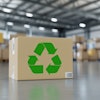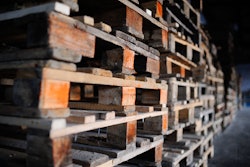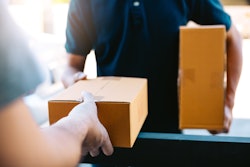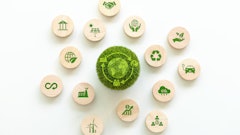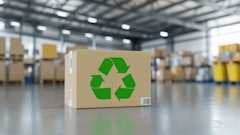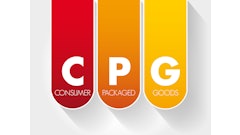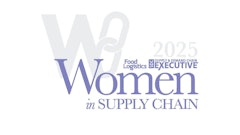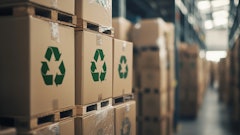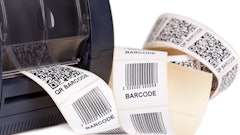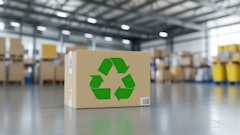
What was used to refer to as the e-commerce boom is now a consumer way of life. In 2020, U.S. digital retail sales topped $844 billion, and in 2022, with the lasting impacts of the pandemic permanently altering consumer behavior, e-commerce is on track to become a trillion-dollar industry. While omnichannel approaches to retail have provided consumers with more convenience and greater choices, this acceleration of e-commerce has led to a pressing need for packaging materials and is creating a strain on both the supply chain and the environment. The result is higher prices, greater energy use and more waste involving paper and plastic packaging. Collectively, these effects are contributing to growing sustainability concerns that cannot be ignored.
In 2018, the Environmental Protection Agency estimated that more than 30 million tons of packaging ends up in landfills, with recycling only mitigating a portion of that waste, not even close to comprehensively solving the problem. According to the Environmental Defense Fund’s Supply Chain Solutions Center, only 9% of plastic waste is recycled properly. Other studies have found that 67% of manufacturers provide incorrect recycling information on labels. The effects of these shortfalls are devastating - imagery of waste overflowing landfills and oceans immediately comes to mind, but the less visual impacts include the huge volume of carbon emissions resulting from both packaging production and heavier packaging weights that create significant emissions during the “last mile” of the supply chain.
This dependence on paper and plastic packaging is also driving a scarcity of materials, adding further pressure to an overburdened supply chain still struggling to recover from the spring 2020 Coronavirus disease (COVID-19) shutdowns. Since the pandemic began, prices have increased for paper and cardboard, and meanwhile, prices of plastics and resins found in packaging have been consistently on the rise as the industry feels the effects of disrupted production from the Texas deep freeze of February. It underscores an urgent problem must be solved - that the supply chains are clearly not crisis- or disaster-resistant. That’s simply unworkable. It’s now imperative that we generate paper and plastic packaging alternatives quickly. The good news is that technology advances have enabled new sustainable solutions that don’t come with cost or performance tradeoffs.
New materials can pave the way for the evolution of the e-commerce packaging industry, but when making the change, how do companies know which materials are best? Alternative, sustainable packaging solutions that utilize nature’s superpowers, rather than man-made materials that harm planet earth, are ready and available for use. Thanks to advances in technology, these eco-friendly alternatives are beginning to capture an increased share of voice in supply chain conversations. However, it is not enough for alternative packaging to be more sustainable; in order to achieve the ubiquity of existing packaging products, these materials must also be cost-competitive, match or exceed in durability and be scalable.
Mycelium, the root structure of mushrooms, is a renewable bio-material that is already being used to provide sustainable solutions across a number of industries. Mycelium-based mushroom packaging excels due to its unique ability to repurpose and bind together agricultural byproducts into durable,100% home-compostable packaging. The material can be grown in just 1 week and is able to be fully composted at home in just 45 days so that the nutrients can return back to the earth upon completion of its practical use. In essence, mushroom-based packaging is a nutrient rather than a pollutant.
Mushroom-based packaging has the sustainability requirements down pat, but it also competes in cost, durability and scale to be the ideal packaging alternative. It is made with only two ingredients, hemp hurds and mycelium, allowing for cost-cutting on materials and the final product. The nature of mycelium enables it to be fully moldable to accommodate a variety of applications and goods from different industries, and also provides reliable durability and protection. Mycelium is both flame and water resistant, making it suitable for thermal applications and shipping with ice packs that are subject to melting. To date, mushroom-based packaging has proven to be scalable. It is already being used across 30 countries, and mycelium producers are poised to rapidly increase licensing and distribution to be the essential solution to the packaging crisis.
Click here to hear more about sustainability and packaging in the supply chain:
Beyond environmental and sustainability benefits alone, alternative packaging materials such as mycelium can help brands grow profitability and customer loyalty, as more consumers turn to brands with eco-friendly ethos than ever before. The National Retail Federation found that now 57% of consumers would change their purchasing behavior if it helped to reduce environmental impacts. Further, a McKinsey study found that 66% of all respondents and 75% of Millennial respondents said they considered sustainability when making a purchase. Companies that have turned to sustainable practices have seen favorable financial outcomes as a result of their pivots.
Implementing innovative solutions such as mushroom-based packaging into the e-commerce supply chain won’t happen overnight, but there have been many examples of more sustainable alternatives successfully becoming commonplace. We see this in big splash campaigns within the fashion industry, which has a number of specific practices and brands developed to combat the environmental impacts of fast fashion and working to reduce the 26 million pounds of textile waste seen each year. Sustainable materials have now become more commonplace, according to Infinium Global Research, the vegan leather market is expected to reach $89.6 billion by 2025, and it’s already being utilized by retailers of all price points.
E-commerce will continue to expand at unprecedented rates, and as such, the associated packaging problem must be addressed to alleviate growing supply chain and environmental costs. The time has come to completely rethink existing packaging materials and make sustainable options the norm, not the exception. By turning to materials like mycelium for packaging needs, the e-commerce industry can be the leader in smarter packaging choices to sustain and enhance the planet.




